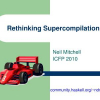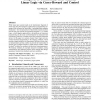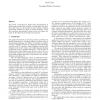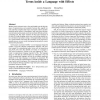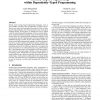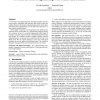137
click to vote
ICFP
2010
ACM
15 years 2 months ago
2010
ACM
Most current techniques fail to achieve the dynamic update of recursive functions. A focus on execution states appears to be essential in order to implement dynamic update in this...
ICFP
2010
ACM
15 years 2 months ago
2010
ACM
117
click to vote
ICFP
2010
ACM
15 years 2 months ago
2010
ACM
While many type systems based on the intuitionistic fragment of linear logic have been proposed, applications in programming languages of the full power of linear logic--including...
154
click to vote
ICFP
2010
ACM
15 years 2 months ago
2010
ACM
We describe the design, implementation, and use of a machinecertified framework for correct compilation and execution of programs in garbage-collected languages. Our framework ext...
127
click to vote
ICFP
2010
ACM
15 years 3 months ago
2010
ACM
We present a technique for higher-order representation of substructural logics such as linear or modal logic. We show that such logics can be encoded in the (ordinary) Logical Fra...
147
click to vote
ICFP
2010
ACM
15 years 3 months ago
2010
ACM
Modern proof assistants such as Coq and Isabelle provide high degrees of expressiveness and assurance because they support formal reasoning in higher-order logic and supply explic...
148
click to vote
ICFP
2010
ACM
15 years 3 months ago
2010
ACM
Several recent security-typed programming languages, such as Aura, PCML5, and Fine, allow programmers to express and enforce access control and information flow policies. Most of ...
146
click to vote
ICFP
2010
ACM
15 years 3 months ago
2010
ACM
A wide range of computer programs, including compilers and theorem provers, manipulate data structures that involve names and binding. However, the design of programming idioms wh...
107
click to vote
ICFP
2010
ACM
15 years 3 months ago
2010
ACM
We present a case-study of using OCaml within a large product development project, focussing on both the technical and nontechnical issues that arose as a result. We draw comparis...
ICFP
2010
ACM
15 years 3 months ago
2010
ACM
Matsuda et al. [2007, ICFP] and Voigtl

